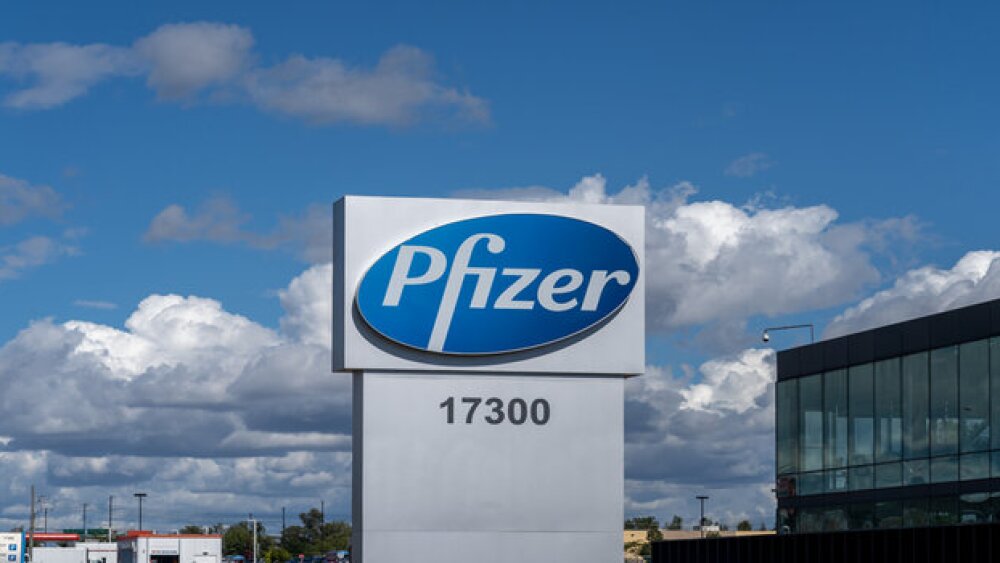A revised Paxlovid supply agreement with the U.S. government has pushed Pfizer to launch a “cost realignment” program including layoffs, though it is still unclear how many employees will be affected.
Pictured: Pfizer signage at its facility in Canada/iStock, JHVEPhoto
Pfizer late Friday launched a sweeping cost-cutting initiative aiming to generate $3.5 billion in savings through 2024 as the company weathers a steep decline in the sales of its COVID-19 products.
The company said the “multi-year, enterprise-wide cost realignment program” will involve layoffs, though it is still unclear how many employees will be affected. Pfizer expects to absorb a one-time upfront cost of $3 billion, largely due to severance payments and to fund the implementation of the cost-cutting program.
Pfizer is aiming to achieve $1 billion in savings this year and deliver the remaining $2.5 billion in 2024. The company will continue to refine its savings and costs figures through the rest of 2023, which will be reflected in its guidance for next year, according to the announcement.
Also on Friday, Pfizer announced that the terms of its supply agreement with the U.S. government for its COVID-19 pill Paxlovid (nirmatrelvir/ritonavir) had been revised. Under the adjusted deal, the government will return to Pfizer approximately 7.9 million treatment doses of Paxlovid, which had previously been distributed around the country as part of an emergency effort to stem the pandemic.
Paxlovid was initially given an Emergency Use Authorization (EUA) in December 2021, though this was later converted to full approval in May 2023. Pfizer will make the NDA-labelled Paxlovid commercially available by the end of the year, while the EUA-labelled drugs will remain free-of-charge to eligible patients until then.
As a result of these returned doses, as well as the delayed transition to commercialization, Pfizer is slashing $7 billion from its full-year 2023 revenue expectations for Paxlovid. The company is also lowering its 2023 revenue outlook for its COVID-19 shot Comirnaty by approximately $2 billion, driven primarily by a drop in vaccination rates.
In related news, BioNTech on Monday announced that it is evaluating the potential impact of Pfizer’s write-offs and other charges related to Comirnaty on its financial results. “BioNTech’s current expectation is that the Company is likely to recognize the effect of Pfizer’s inventory write-offs and other charges related to Comirnaty in the third quarter of 2023 up to €0.9 billion, which represents BioNTech’s half of the gross profit-sharing agreement with Pfizer,” according to the announcement.
Despite the slowdown in its COVID-19 business, Pfizer CEO Albert Bourla said in a statement that the company’s non-COVID products portfolio “remains strong,” adding that it still expects these assets to generate year-over-year operational revenue growth of 6% to 8% in 2023.
The adjusted supply agreement with the U.S. government also provides Pfizer with more “clarity” regarding the pathway to commercialization for Paxlovid, Bourla said. The company is looking forward to “additional clarification” on global vaccination rates, which will allow it to better predict the utilization levels for its COVID-19 portfolio in the future, he noted.
“We continue to expect our COVID-related revenues to contribute to our business in future periods, helping us to further invest in activities that drive Pfizer’s long-term growth potential,” Bourla added.
Tristan Manalac is an independent science writer based in Metro Manila, Philippines. He can be reached at tristan@tristanmanalac.com or tristan.manalac@biospace.com.






